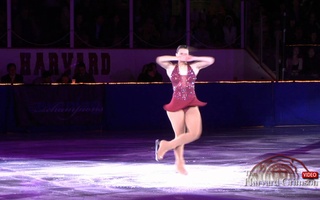{shortcode-ab1508e1a5f7de641dd6d478e1f4076ad1f245bb}Last Thursday, Oct. 22, the Isabella Stewart Gardner Museum hosted the Malaysian singer Yuna in its “sonic cube,” an architecturally experimental venue that perfectly matches the boundary-defying nature of Yuna’s music. Despite impressive mainstream success—she’s a household name in her home country as well as the voice behind U.S. hits like the Pharrell-produced “Live Your Life” and the popular “Lullabies”—Yuna remains unknown to most. Those who do listen to her music are an eclectic mix: Young couples, African fashion designers, and even a tenured Harvard professor all crowded into Calderwood Hall for Yuna’s performance.
Yuna, in an impressively wrapped headscarf and a funky yet tasteful outfit, personified art devoid of gratuitous attention-seeking. She was at an art museum, and art she would deliver. While many artists rely on the “sex sells” mentality to draw attention to their music, Yuna does no such thing. By eschewing the overtly sexual references with which pop music is rife, she is free to explore the personal aspects of relationships more deeply, creating for herself a multi-dimensional identity free from the archetype of performer as spectacle.
With her rich voice and honest lyrics, Yuna lent meaning to songs like “I Want You Back” that might have proven trite in the hands of another artist. While many of her songs deal with heavier issues such as heartbreak and the dark side of fame (“Someone Who Can” and “Lights and Camera,” respectively), Yuna balanced out her set with songs that were lighthearted, even jubilant. “Rescue,” a song celebrating female empowerment, was downright catchy, and “Escape” was so upbeat that an elderly audience member began dancing, cane in hand.
According to Yuna, many of her songs are written based on personal experience. While the template of confessional songwriting could have easily degenerated into a barrage of hackneyed sentiments, Yuna’s evocative lyrics and unique vocal styling kept the songs fresh and honest. Instead of following the predictable formula of emotional climaxes, Yuna laid out a natural narrative that never felt overdramatized. She also knew how to order her songs for maximum effect: Instead of interspersing the lighter songs with more serious ones, Yuna chose to place similar songs next to each other, thereby allowing the emotional intensity of one song to build upon that of another.
Another integral part of her effect was Yuna’s unique singing style. Her artful vocal fadeouts and agile maneuvering of the high points in her songs were passionate without being overdone, and she embraced the natural imperfections of her voice for a deeply intimate and emotional experience. Her cover of Drake’s “Hotline Bling” was stunningly vulnerable; she stripped the music down to its essence and, through whispery highs and anguished lows, relayed a beautiful rendition that simultaneously channeled and innovated the spirit of the original song.
But it was the guitar that provided the unexpected yet essential accompaniment for Yuna’s Drake cover. Braden Lyle’s sound possessed just the right amount of twangy echo, and every so often, a piercing melody would weave beautifully with Yuna’s soft voice. While instruments often play a secondary role to the singer’s vocals, Yuna’s cover of “Hotline Bling” sounded more like a duet between her and the guitarist. This unconventional rendition illustrated how instruments play a crucial role in Yuna’s music, imbuing it with its rich and unusual sound. By mixing traditional Malaysian instruments—usually drums—with electric guitars, keyboards, and even the ukulele that she played herself, Yuna brought interest and dynamism to these oft-neglected backgrounds of pop music. In attending to the entire aspect of her songs, Yuna created a deeply expressive musical panorama that was emblematic of her work as an artist.
Altogether, Yuna’s performance fully conveyed the artistic and personal insightfulness that allows her to write music that is both meaningful and beautiful. In an era where the artist is often just as much a spectacle as she is the art she makes, Yuna has managed to put her music first, creating a genuine artistic experience that explores the archetypal themes of self-empowerment and young love in a way that is as innovative as it is intimate.
Read more in Arts
Artist Spotlight: Angélique KidjoRecommended Articles
-
 An Evening with Champions 2011
An Evening with Champions 2011 -
On Thin IceRemember when figure skating was popular, even events that weren’t the Olympics? The days of Michelle Kwan in all of her glory?
-
 Guilty Pleasures: 2012-2014 Austin Mahone
Guilty Pleasures: 2012-2014 Austin Mahone -
If Your Favorite Band Is The Chainsmokers, You’re Doing Something WrongMusic groups like the Chainsmokers are successful because they produce catchy music, not because they produce good music.
-
 From Boston Calling 2018: Saturday Sound Bites
From Boston Calling 2018: Saturday Sound Bites













